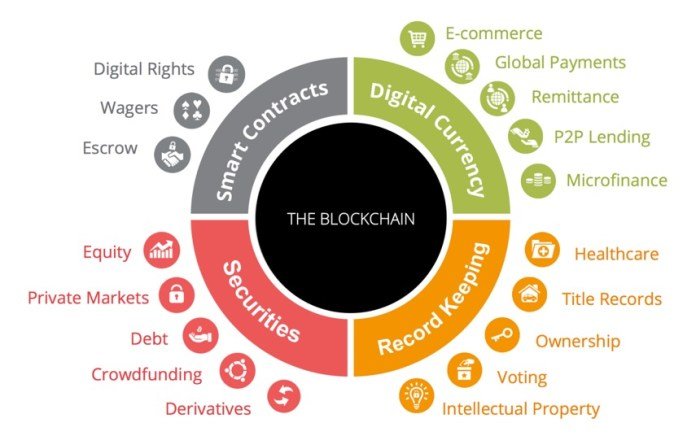In the list of most disruptive technological developments at the moment, blockchain technology is number #1. What few realize, however, is that the decentralized philosophy behind blockchain technology can not only be applied in the form of cryptocurrency. It can shake up entire markets and replace the Internet as we know it in the not too distant future with a new internet. This certainly applies to the online advertising industry as we know at the moment. What forces are there and what is the potential impact on the advertising industry ‘as we know it’?

Something is going on in online advertising land
Last week, Mark Zuckerberg announced that Facebook wants to become ‘social’ again and wants to show less content and advertisements from companies in the timeline of Facebook users. Your first reaction might be that it is a nice gesture. At the same time, Facebook probably sees that the over-monetization of the platform has helped to make the platform bleed to death as a social medium. In the past, my friends sometimes shared something via Facebook. In recent years, this content has been limited in addition to commercial content and advertisements, in particular to messages that were posted by my grandmother (quiet) and more senior audiences. Younger target groups find their way through low-threshold and visual apps such as Instagram and Snappchat. Of course, Facebook has been in the mood for some time now and has adopted the acquisition strategy accordingly. Zuckerberg is not a stupid boy. On January 4, he shared his vision for the coming year on Facebook:

Zuckerberg spot decentralization, blockchain technology, and cryptocurrencies as a force that will have a severe impact in the coming years. The Winklevoss twins (Zuckerberg’s’ “arch enemies” during the initial period of Facebook) did that a lot earlier. With their Crypto Exchange Gemini (founded in 2015) and their investments in Cryptocurrency, this time they have jumped on a technological train that potentially has a more significant impact on the world than all social media combined.
Artificial intelligence and the internet of things
Google sails a slightly different strategic direction than Facebook. Where Facebook has mainly focused on making its insight into user data as large as possible to be able to target users profiles in a very targeted way, Google focuses on artificial intelligence and the Internet of things.
In an online world in which the industry mainly runs on advertising revenue, both Google and Facebook will realize that the advertising model as we know it can erode in the long term, just as it happens with mainstream media.
The difference between Facebook and Google is that Facebook runs on the network between people and that Google does not have this dependency or to a lesser extent. Even when the internet as we know it will change and transform into a secure, decentralized network where personal data is 100% safe and not traded by a few tech giants, Google will know how to plug in this new infrastructure. If not Facebook. Facebook now leans on a foundation that they own centrally. When safe and decentralized alternatives emerge, Facebook runs the risk of falling under its centralized nature.
Organize online advertising in a decentralized manner
Now try to imagine that a handful of centralized tech giants would not control online ads, but that you as a user could decide for yourself which content you value and then get a refund for the attention you paid to consume specific content? It is the current online advertising model ‘upside down,’ say.
Nevertheless, the above is precisely what CEO Brandan Eich (Mozilla co-founder and inventor of Javascript ) is trying to achieve with his blockchain startup and the Basic Attention Token (BAT). To this end, they have developed the Brave browser (already> 1 million downloads) and are working on an ecosystem on the Ethereum blockchain where advertisers, publishers, and users are connected to each other in a decentralized manner.
Imagine that loading advertisements and tracking codes now use a large part of your internet bandwidth. Besides, advertisements and trackers use the extra power and shorten the lifespan of, for example, the battery of your smartphone. Indirectly, therefore, you pay for loading advertisements that you did not ask for at all. They are arguments I have picked from the BAT site, but it is a legitimate and underexposed issue in my opinion.
What does decentralization mean for the online advertising industry as we know it?
On the short-term? Not so much. There are, however, several startups and projects that address the problems outlined above that blockchain technology are used to achieve better solutions. Solutions where the user will once again become the central focus instead of a handful of large corporate wielding the wand. In the long term, you can, therefore, expect blockchain technology (or other decentralized solutions) to shake up the advertising industry, just as the online advertising industry did in print media and TV commercials. However, it is still in its infancy at the moment, and the cards are not even shaken yet, let alone shared.
In my view, however, it is a good development and an evolutionary step for the online ecosystem. For entrepreneurs and companies that want to use the online channel (more) to plug in the growth opportunities that the internet offers, the current ways of online advertising are still the way to get more results from the online channel. In the long term, however, it is good to continue to follow developments in the field of decentralization. Not only because it can shake up the online advertising industry, but because it potentially contributes to better user experience and – most importantly – the (privacy) rights of users can return to the ones they belong to the user.
Data analytics expert. As an analyst and project manager, I have proven to be a strong leader and team player in maintaining a suitable workspace for workers and industries in the oil and gas sector.
By taking into account various factors, with the assistance of state of the art technologies and the utilization of Big Data Analytics.
This includes considering various aspects like volume, velocity, variety, veracity, value together with complexity.
With the recent advent of data recording sensors in exploration, drilling, and production operations, oil and gas industry has become a massive data intensive industry.





